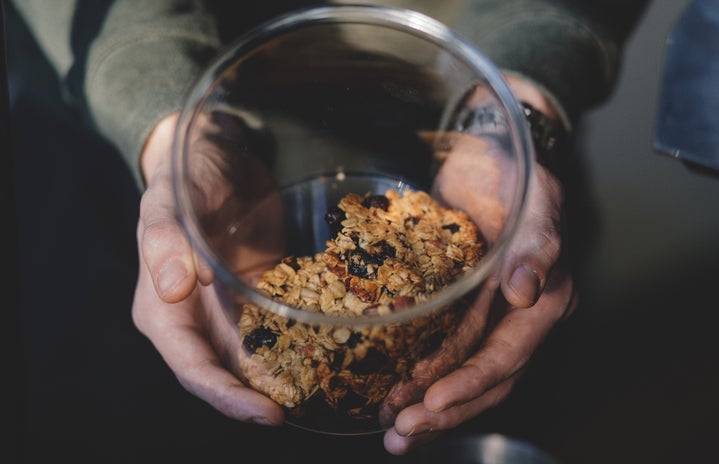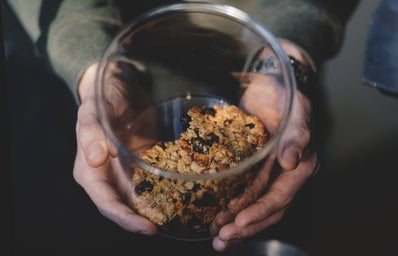College students are notorious for that Freshman 15 — with busy schedules and bad food, sometimes nutrition and fitness fall off the radar. With half the semester gone, we’re in that midterm slump, and grabbing fast food to-go or skipping a workout (or two) is starting to sound more tempting than keeping up with a super healthy lifestyle. But with advice from a panel of experts, nutritionists, doctors, and girls who have been there before, here are 15 ways to make beating that Freshman 15 a piece of cake.
1. Sleep!
Whether you’re spending long nights out with your friends or you’re in the library studying, a lot of girls don’t get the recommended amount of sleep necessary for their health. Dr. James O’Brien, the medical director of the Boston SleepCare Center in Boston, Massachusettes says, “sleep is not a luxury; it’s a necessity for optimal functioning.” While you sleep, your body releases hormones that regulate energy, mood and mental acuity. Jackie Keller, nutrition expert, professional wellness coach, Le Cordon Bleu-trained chef and Founding Director of NutriFit agrees. “Lack of sleep causes your brain to release less serotonin. Because serotonin is the calming, happy neurotransmitter that helps us relax, our body compensates by encouraging us to get our serotonin through other means like eating sugary, salty or fatty foods. If we’re serotonin deprived, we often eat more, and have more meals overall.” You need 7 to 8 hours of sleep for your body to function properly, so get yourself into a routine where you’re in bed by a decent hour and won’t end up sleeping all day and staying up all night.
2. Beware of the Sweats!
Sweatpants are your best friend and your worst enemy. After all, there’s nothing better to roll out of bed and head to your morning lecture in and let’s be real, who dresses up to go to the library? Laura, a recent graduate of Western Illinois remembers getting a little too comfy in her sweatpants. “I never realized I was gaining weight because my stretchy pants allowed for a ton of wiggle room. Until I put my jeans back on, I had no idea I had gained a few extra pounds.” Make sure to throw your jeans on for class every once in a while. Not only are they cuter, they’ll also keep you in check.
3. Watch Your Stock!
Although it can be tempting to pick up bags of Cheetos and a box of macaroni and cheese at the store, remember that filling your dorm or apartment with junk food makes it a lot harder to eat healthy. Try fruit or granola (granola barscan sometimes be just as unhealthy as candy bars!) and stock your room with healthy food options so you can snack guilt-free. Kelly Klaczkiewicz CSP, registered dietician and nutritionist, suggests choosing one fruit or veggie with every meal and snack. “Load up on veggies; you can never eat too many!” Klaczkiewicz says.
4. Drink Water!
According to Keller, nutritionist to A-List celebs like Reese Witherspoon, Channing Tatum and Penelope Cruz, it’s important to drink water throughout the day because “water helps everything move along through your digestive tract and aids your metabolism. Since your body is made up of about 70 percent water, being dehydrated affects everything in your body.” So how much water should a collegiette be drinking each day? Calculate the amount by dividing your body weight in pounds in half — this is the number of ounces of water you should have every day. In addition, water helps us stay full, Keller says, so drinking up will help you avoid overeating! Try carrying a water bottle to class — the Centers for Disease Control and Prevention says it’ll help you drink more water throughout the day!
5. Don’t Order Takeout!
According to Bonnie Liebman, nutrition director of the Center for Science in the Public Interest, a typical Chinese takeout meal can have up to 1,300 calories — well over half of the 2,000 suggested caloric intake per day. Italian and Mexican food can be the same, or worse, because it’s higher in saturated fat. Instead of ordering that late-night takeout, start a “Jeans Fund” and put ten dollars in that fund every time you’re tempted to grab a meal after a night out. Monitoring the times you eat out will puff up your wallet and not your waist.
6. Shimmy It Off!
The easiest way to stay fit is to sign up for classes at the local gym or rec center — when you’re in a class setting, you’re more likely to stay on task. Most university gyms offer classes like Zumba, hot yoga, and hip-hop as part of the gym membership or for discounted prices to students, so ditch the treadmill and check out the class schedule instead — and once you’re going to class regularly and make it part of your routine, it’s easy to keep up with. It’s also a great place to meet new friends, who can be your best fitness motivators!
7. Watch the Booze & Be Choosy With the Chaser!
One shot (1.5 oz) of 40 percent vodka has around 60 calories. Take a second and mentally add up how many shots you have in a night with the calories in your chasers — and don’t forget the late-night food! A lot of girls think they’re avoiding extra calories by choosing hard alcohol over beer, but the truth is, shots of hard alcohol, especially when paired with chasers, add up quickly too. “Alcohol interferes with the body’s ability to burn other substances that we consume. While our body is dealing with the alcohol we’ve consumed, the other food, like chips, soda, or even healthful foods are not being burned, they’re being stored. The calories from alcohol have no nutritional value (with the exception of a few benefits of red wine) so those calories take the place of good, quality calories from healthy food,” Keller explains. Still planning on partying? To steer clear of those unwanted calories, order drinks without soda or sugary chasers and mixers. Grace, a junior at the University of Illinois, says she sticks with the bare minimum when it comes to chasers. “My friends and I make a pitcher of Crystal Light if we’re pre-gaming before going out. It’s flavorful enough to cut the alcohol and the To-Go packs are only 10 calories each!”
[pagebreak]
8. Clean Your Room — Seriously!
Nutritionists (and moms, too!) would agree that cleaning your room has more than one benefit. Sarah Brown, a fitness expert at thatsfit.com says that 30 minutes of vacuuming can burn 75 to 100 calories. Vacuuming is a great arm workout, bending down to pick up clothes and scattered things has the same effect as squats, and cleaning under your bed or behind your bookshelf works muscles everywhere. For an added workout, do your laundry — it’s not easy walking up and down the stairs with 15 pounds of clothing in hand!
9. Invest in Cute Workout Wear!
It’s okay to allow a little self-indulgence in exchange for some motivation, and according to Lizzie, a freshman at the University of Illinois, it works! “I went to Dicks Sporting Goods before I left for school and bought a few really cute neon sports bras and workout shorts. I also invested in a pair of Nike Frees gym shoes that were so comfortable. The only place I could show off my new things was the gym. Even if I didn’t end up there for the right reasons… I still ended up working out.”
10. Avoid the Snack Attack!
We’re all guilty of it; mindlessly snacking is a horrible habit for your health. Klaczkiewicz says, “avoid eating and snacking while studying or watching TV because it can quickly add up.” Kendall, a junior at Clemson University suggests gum instead. “I think it’s that need to be chewing on something,” Kendall says. “Gum works for me to avoid snacking when I’m bored and not even hungry.” If you’re going to snack, don’t eat anything straight out of the bag. Make sure you take a portion out otherwise you’ll end up overeating.
11. Be Careful of the Caf!
Cafeterias can be dangerous, especially if you have a meal plan — which means you can stop by anytime for a bite to eat. With dining halls typically being buffet style, it’s hard not to stock up — and when you’re socializing with your friends as you eat, you might not even notice that you’ve started on your third course. Portion control is important — The American Heart Association recommends ½-cup servings of rice, noodles, hot cereal, most vegetables, and fruits. Meat and fish should be served in 3-ounce portions — that’s about the size of a deck of cards.
12. Watch How You Cook!
Sometimes all it takes are a few minor substitutions to get your health back on track. Keep seasonings on a shelf, not on the table, so you don’t overload on the sodium, and cook in olive oil instead of vegetable oil. Olive oil contains monounsaturated fats and is high in antioxidants, so you get healthier fatty acids and protection against heart disease. If you eat home-cooked meals every day (and no, ramen or mac ‘n cheese don’t count!), being conscious of what and how much you put into your concoctions can make a difference. So don’t forget to use measuring cups, too — that way, you won’t overdo it with the butter or put too much sugar into those goodies.
13. Eat Breakfast!
Start your day off right with a healthy breakfast! Keller reminds us to “put emphasis on breakfast– The most important meal of the day. A healthy breakfast increases a student’s ability to concentrate and learn. It is also important for setting the tone for the rest of the day. Whole grain cereal, oatmeal, fruit and eggs are all great options.” Jennifer Iserloh, trained chef, health expert and author of “Skinny Chef” suggests making your breakfast healthier by using two egg whites and one full egg, for example. This way, you still get the benefits of protein while avoiding the extra saturated fat.
14. Watch the Heaps of Special Occasion Food
The spring is full of countless tempting occasions: spring break, Easter, time spent at home.. Allow yourself to indulge in the savory treats of these special occasions but don’t overdo it. Try substituting a second helping of dinner for a smaller dessert, or forgoing soda so you can munch on yummy spring break cocktails (virgin or real). Keep everything in moderation and you’ll be able to enjoy these special events without stressing about weight gain.
15. Don’t Overthink It!
Forget about the celery sticks and rice cakes and eat healthy meals during meal times. If you overthink it, you’ll stress — which can cause weight gain. “Chronic stress can be tied to an increase in appetite — and stress-induced weight gain,” says Elissa Epel, PhD, an assistant professor in psychiatry at the University of California at San Francisco, in a feature on WebMD. Be conscious about your lifestyle, but don’t forget to allow yourself to indulge, too!
Follow our fifteen guidelines and you’re sure to have an outstanding rest of the year, worry-free of those fifteen unwanted pounds.

